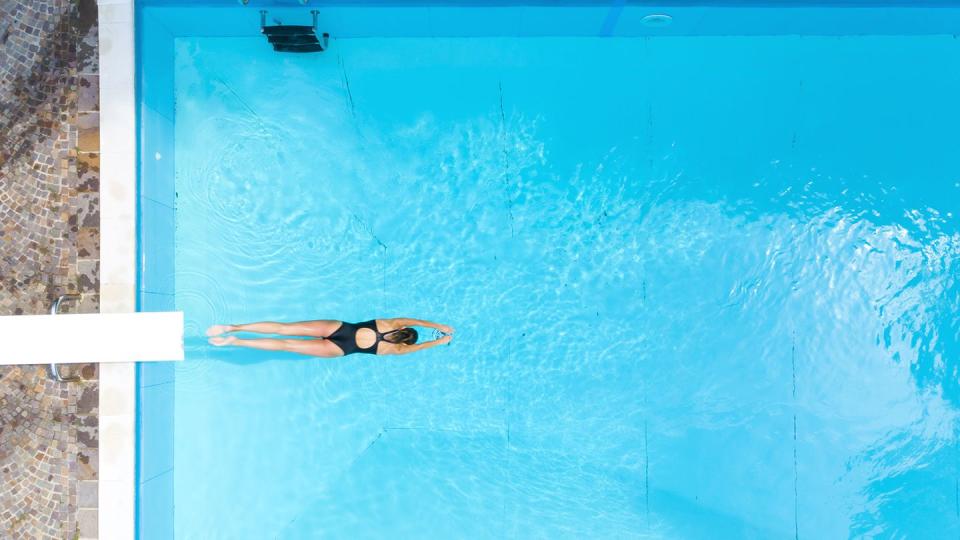Kate Middleton’s Favorite Workout Has A Ton Of Mind-Body Benefits

- Oops!Something went wrong.Please try again later.
You might not imagine that the go-to workout of a literal princess is jumping into an ice cold pool, but Duchess of Cambridge Kate Middleton says it's her favorite.
"I love cold swimming," her Royal Highness said on The Good, The Bad, And The Rugby podcast on September 9. "The colder the better."
When the podcast hosts asked Prince William and Kate to list their favorite sports (other than rugby, of course), Kate chimed in almost immediately with her unconventional workout. "[I like to swim] when it's crazy, and it's dark, and it's raining," she said.
Meet The Experts: Hayden Steele, CPT, strength coach and co-founder of the SHOCK app. Kristen Lettenberger, DPT, a physical therapist based in New York.
Women's Health investigated her Royal Highness' workout of choice, with the help of certified personal trainer Hayden Steele and physical therapist Kristen Lettenberger, DPT. Here's everything to know:
For starters, what qualifies as cold water swimming?
The Duchess of Cambridge didn't explicitly say what temperature she prefers to swim in, but ice swimming, or cold swimming, is defined as swimming in temperatures below 41 degrees Fahrenheit, according to The National Library of Medicine. Steele says the temperature can vary between 45 and 60 degrees Fahrenheit.
Both Steele and Lettenberger agree that cold water submersion and swimming have synonymous benefits, so there isn't much of a distinction between the two.
Is cold swimming a safe form of exercise?
It depends. Ice swimming can have a lot of health benefits—so long as your body is in good health and well-adjusted with extreme cold, per the NLM. And experts agree. Hayden Steele, CPT, says "everyone" should give ice swimming—which has very similar health benefits to cold plunging—a try.
"It's pretty good for everybody, and I wouldn't normally say that [about other fitness trends]," Steele adds.
The trainer loves incorporating cold plunges into his morning routine, but he doesn't necessarily recommend cold swimming as a regular workout. In fact, even while training hardcore athletes, Steele only allots about 11 minutes per week for a cold water submersion. On your first cold water excursion, you should probably only stick to a few seconds, Steele advises.

Kristen Lettenberger, DPT, is a bit less in the support camp of ice swimming (especially for everyone). The physical therapist says that adding the activity to a standard workout routine can have risks—including negative affects on the cardiovascular and pulmonary system—depending on how equipped your body is to handle it.
Ice swimming can be dangerous for people who haven't tried it before extensively—and can cause other issues such as hypothermia. Basically, it's not something you can just "plunge" right into. Case in point: The Duchess of Cambridge said on the podcast that she's been swimming from a very young age—so her body is likely well-acclimated to cold water.
What are cold swimming's health benefits?
If your body is well-equipped to handle the cold, there are plenty of benefits to cold swimming and plunging (which, according to experts, aren't really that different).
For one, there are lots of mental benefits to the practice, says Steele, who starts his day with a two-minute cold shower to help him with his anxiety. While you're submerged in cold water, your body releases stress hormones epinephrine and norepinephrine, which lowers your overall stress afterward, he says.
"It helps what's called a 'top down control'—when you're put in cold water, most people feel uncomfortable," Steele explains. "It makes your body deliberately fight this cold environment, which helps you cope better and maintain a calm, clear mind when you're confronted with real world stressors."
Lettenberger recommends the practice for anyone who considers themselves able to stand the cold, because swimming in cold water improves circulation, reduces inflammation, can improve the pumping of your heart, and increases insulin sensitivity (which reduces blood sugar). Steele adds that cold water submersion can increase metabolism, too.
Who should try cold swimming?
Experts agree that cold swimming can have certain benefits, but it isn't something you must do for good health. In fact, you should always check with your doctor before taking up any cold water activity if you have an ongoing health condition, says Lettenberger. And you may want to avoid it altogether if you have any kind of heart condition.
However, if you consider yourself reasonably healthy, it might be a great way to reduce stress and improve circulation in your body. Anyone who feels they might benefit from those health improvements may consider giving cold swimming a try.
And when in doubt about temperature, listen to your body. Steele says that it probably isn't possible to overdo cold water submersion, because the practice itself is so miserable—you'll want it to be over as soon as possible. "The rule of thumb is the colder the water, the shorter the time [submerged]," he notes.
Are there any alternatives to cold swimming?
You might not have a cold body of water at your disposal, but you can still try a form of cold swimming. Experts agree that a cold shower provides pretty much the same benefits, and that's a lot easier to come by. You can also try finding a local cold plunge facility, Lettenberger says.
Now, you're fully equipped to workout like royalty. And if it isn't your thing—that's okay, too. Even Prince William doesn't seem totally convinced.
You Might Also Like

